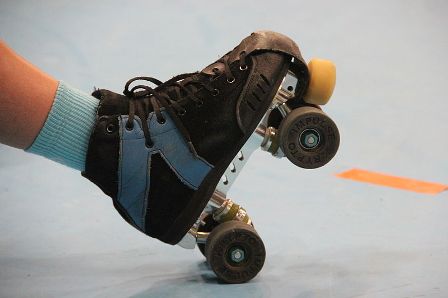roller derby: sport or spectacle?

It’s a Saturday night in Newcastle. I stop off for a coffee along one of the city’s café strips, hoping to keep up the high from the roller derby bout I have just seen. Upon spying the local league’s shirt I wear, a male waiter prods me with questions I am ill-suited to answer as a mere fan and horrendous skater. Yet one question pops up that I do know the answer to:
‘Are they allowed to punch on with each other?’
‘No.’
‘Oh, what a bummer.’
With dramatised accounts of the sport’s culture in the feature film Whip It and the antics portrayed in the game of television’s golden era, the thought of roller derby as a catty stage show persists in the fantasies of derby virgins. Newcastle Roller Derby League’s Glitter N. Gore and GodJilla Sold Separately encounter similar assumptions of the sport’s brutality when people become aware of their sporting personas.
‘I guess the main reaction I get from [them] is “aw you must be tough, that’s pretty dangerous isn’t it? It’s a pretty violent sport?”… it’s controlled though,’ Glitter says.
The reality of the full contact sport is far from these expectations. Roller derby leagues are in every sense tightknit, hardworking and – to use a term frequently thrown around by players, yet no less valid – empowering communities to be a part of. With a philosophy of “by the skater for the skater”, the common goals of the women who play the sport fosters an overwhelming sense of inclusion with every size, shape, colour and creed being recruited to be jammers, blockers and pivots.
Whilst tensions might run high on the track, the general consensus of players commend one another later for their ability to knock and block them with their hip, shoulder or booty. The heat of the moment is forgotten for the skill of the defence.
‘I think in other sports it’s like “aw, that bitch hit me” – there’s just none of that [here],’ GodJilla says.
For Glitter, this was initially a hard concept to grasp a hold of. Coming from being involved in the heavy metal music scene in which she witnessed many women try to keep each other down, encouragement in her fresh meat training was misconstrued as veiled criticism.
‘Everyone just wants everyone else to do well. That was something that took me a while to get used to, now I don’t think I could live without it,’ Glitter says.
Derby is a far cry from the self-described “men’s sports” GodJilla has been a part of, likening her experiences on the women’s sides of inline hockey and rugby union to almost feeling like ‘comic relief’ or ‘after-party relief’ for the boys. Instead the men involved in refereeing and otherwise contributing to the games are just as dedicated to advancing the women’s sport. Indeed, this increasingly seems the case as the emerging male code of the sport slowly but surely gains a following.
However, modern day derby still showcases relics present from the sport’s past in its sparkly costumes, the ‘skate out’ performances before a bout and the tongue-in-cheek monikers of the women. While the playfulness of the sport’s culture is beloved by its fans and players alike, increasingly derby’s women are aiming to be recognised as professional athletes. Perhaps the most fervent debate is over derby names, a key issue as the game gains more recognition worldwide. A former member of NRDL started with and continues to use her real name as she pursues the sport in the United States. For GodJilla and Glitter their names are a chance to separate the business that is life from the passion and pleasure that is their sport of choice, yet the concept does have resonance for them.
NRDL Public Relations officer Snow Wicked says there is a delicate balance to promoting the sport born out of spectacle. While the lure of derby’s culture is an incentive to initially hook the audience, the efforts of commentators to explain the fast paced game is what keeps crowds coming back.
‘[I]f they don’t really understand how the game works then they see it only as a spectacle and we try to shy away from that as soon as we get the audience in,’ Snow says.
The issues at hand for roller derby, particularly regional leagues such as NRDL, are far from over while there is still a steady tug of war between the game and its culture. With the sense of drive this community has though, sooner or later it’ll be smooth skating.

